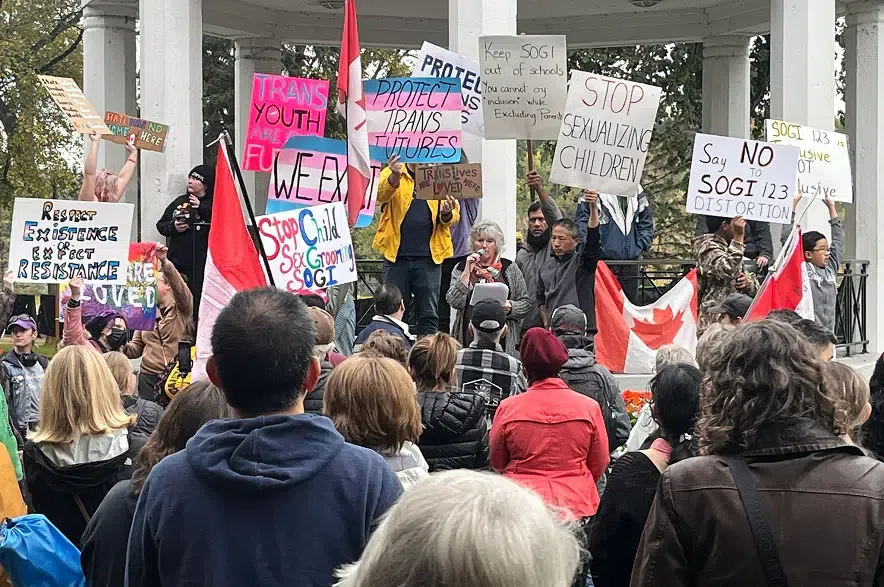A legal challenge over the provincial government’s controversial pronoun policy can go ahead, according to a ruling delivered on Monday by the Saskatchewan Court of Appeal.
The policy, which requires schools to get parental consent before changing the name or gender that a student 16 or younger uses in school, caused a storm of controversy when it was first announced. The law also requires that parents be notified when schools teach sexual health education and gives them the option to take their kids out of the class if they wish.
Read more:
- Saskatoon mayor to review conditions allowing controversial MAGA Christian singer’s concert
- Massive Shoe Fire remains uncontained as 84 blazes burn in Saskatchewan
- Canada’s federal voting system is constitutional, Ontario Court of Appeal rules
UR Pride, an LGBTQ+ advocacy group, launched a legal challenge against the policy, arguing it causes irreparable harm to children and violates the Constitution.
That argument hasn’t been heard yet. The decision on Monday is an appeal of a lower court’s ruling on amendment and procedural matters, which could have stopped the case in its tracks.
The provincial government argued that because the notwithstanding clause was invoked in implementing the law, allowing it to stay in place even if it violates sections of the Charter of Rights and Freedoms, the courts don’t have the standing required to determine its constitutionality.
A Court of King’s Bench justice disagreed in a ruling last fall. The government’s lawyers launched an appeal, but on Monday four of the five Court of Appeal justices sided with the lower court.
They determined that the use of the notwithstanding clause doesn’t nullify the court’s jurisdiction; it simply allows the law to remain in place regardless of whether or not it limits Charter rights.
The written decision made clear that the Court of Appeal wasn’t commenting on whether the pronoun law violates the constitution, and only ruled that the challenge can proceed.
The provincial government did succeed in one of its bids. UR Pride applied for a declaration that the policy had limited the Charter rights of students before it was ultimately withdrawn and replaced by the law, but the court decided that was a moot point.
“The revocation of the Policy, coupled with the absence of any allegation or evidence that any person has suffered harm because of it, renders the challenge to the Policy moot,” read the decision, written by Chief Justice Robert W. Leurer.
But while Saskatchewan’s top court ruled in favour of the challenge proceeding, the government’s legal opposition to the challenge may not end here. Former Justice Minister Bronwyn Eyre has said the government would take the issue to the Supreme Court of Canada if it had to, and would not hesitate to use the notwithstanding clause again.
Dissenting opinion
Justice Neal W. Caldwell was the only judge who dissented from the majority decision.
He argued that the courts no longer have jurisdiction when the notwithstanding clause is used.
“Once the legislative branch has invoked the notwithstanding clause, the judiciary would overstep its constitutional role if it were to interject itself into the democratic process,” read Caldwell’s dissent.
Notably, Caldwell said it “seems probable” that the law would infringe on legal or equality rights if not for the use of the notwithstanding clause.
— With files from 980 CJME’s Lisa Schick and The Canadian Press











